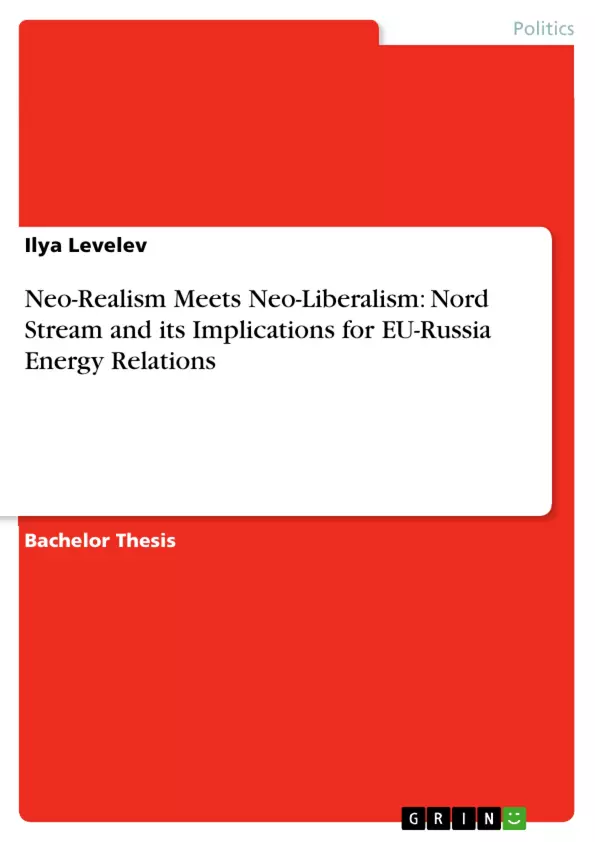The paper analyzes the Nord Stream pipeline and its influence on EU-Russia energy relations. As the paper uses the two theories of neo-realism and neo-liberalism to investigate the project, it examines the pipeline from two different viewpoints. In this sense, two main perspectives are outlined, namely Nordstream as a Pan-European project and Nordstream as a dividing factor for Europe. The aim of this twofold approach is not to find the ultimate truth concerning the pipeline but rather to reveal that such a project can be viewed completely different depending on the geopolitical and historical position of the observer. Therefore, this paper does not see the Nordstream project from the lens of one theoretical approach only, but rather uses the two IR theories complementary to establish a deeper understanding of the pipeline's geopolitics.
Inhaltsverzeichnis (Table of Contents)
- Introduction
- Theorizing International Relations in the Light of Energy: Neo-realism and Neo-liberalism
- Energy in Russia and the EU
- Assessing Nord Stream: Diversification of Gas Supply or Segmentation of the EU Energy Market?
- The Neo-Liberalist Perspective: Nord Stream - A Pan-European Project
- The Neo-Realist Perspective: Nord Stream - Dividing the EU
- Conclusion
Zielsetzung und Themenschwerpunkte (Objectives and Key Themes)
This paper examines the impact of the Nord Stream pipeline on energy relations between the EU and Russia. The analysis focuses on the energy markets of the EU and Russia, which are considered crucial to understanding these relations. The paper employs neo-realism and neo-liberalism as theoretical frameworks to provide different perspectives on the pipeline.
- The influence of the Nord Stream pipeline on EU-Russia energy relations.
- The role of energy in international relations.
- The contrasting perspectives of neo-realism and neo-liberalism on international cooperation.
- The fragmentation of the EU energy market due to differing national interests.
- The implications of the Nord Stream pipeline for European energy security and dependence on Russia.
Zusammenfassung der Kapitel (Chapter Summaries)
The first chapter introduces the topic of the Nord Stream pipeline and its impact on EU-Russia energy relations. It also provides background information on the energy markets of the EU and Russia and their significance in international relations.
The second chapter outlines the theoretical frameworks of neo-realism and neo-liberalism, highlighting their key assumptions and implications for understanding energy relations between the EU and Russia.
The third chapter delves into a comparative analysis of the energy markets of the EU and Russia, emphasizing their unique characteristics and the factors driving their development.
The fourth chapter explores the Nord Stream pipeline from both neo-realist and neo-liberal perspectives, examining the divergent views on its impact on EU-Russia energy relations. It analyzes the arguments of those who see it as a pan-European project and those who view it as a divisive force.
Schlüsselwörter (Keywords)
The main keywords and focus topics of this work include: Nord Stream pipeline, EU-Russia energy relations, neo-realism, neo-liberalism, energy security, dependence on Russia, European integration, internal energy market, geopolitical positions, historical experiences.
Frequently Asked Questions
What is the main focus of this analysis on Nord Stream?
The paper analyzes the Nord Stream pipeline and its significant influence on the energy relations between the European Union and Russia.
Which theoretical frameworks are used in the study?
The study employs two major International Relations theories: Neo-realism and Neo-liberalism, to provide complementary perspectives on the project.
How does the Neo-liberalist perspective view Nord Stream?
From a Neo-liberalist viewpoint, Nord Stream is seen as a Pan-European project that fosters cooperation and gas supply diversification.
What is the Neo-realist perspective on the pipeline?
Neo-realism views Nord Stream as a potential dividing factor for Europe, emphasizing national interests and energy dependence on Russia.
Does the paper aim to find a single "truth" about Nord Stream?
No, the goal is to reveal that the project can be interpreted differently depending on the geopolitical and historical position of the observer.
What are the implications for European energy security?
The paper explores how the pipeline affects security of supply and whether it leads to a segmentation of the internal EU energy market.
- Quote paper
- Ilya Levelev (Author), 2011, Neo-Realism Meets Neo-Liberalism: Nord Stream and its Implications for EU-Russia Energy Relations, Munich, GRIN Verlag, https://www.grin.com/document/175801



